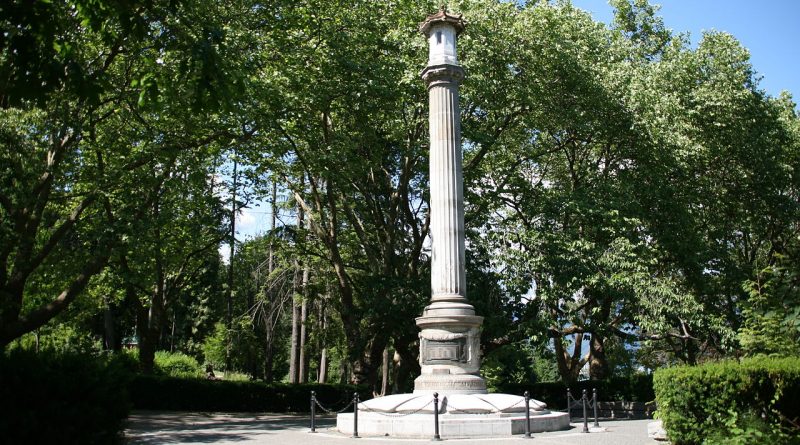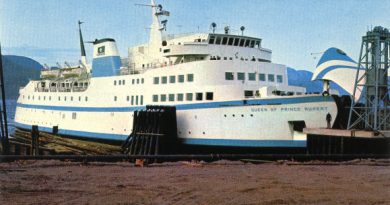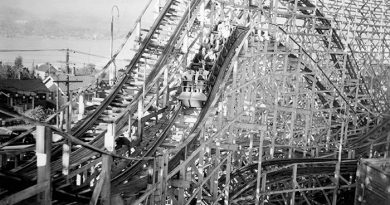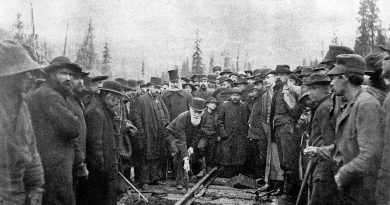1917
Above: Picture of the Japanese War Memorial (cenotaph) in Stanley Park
[Image: Wikipedia]
*****************************************
You’ll note that these years include events listed under “Also in . . .” These are events for which we don’t have a specific date. If YOU know the specific date of an event shown there, please notify us . . . and cite the source! Many thanks!
*****************************************
January 1 The Workmen’s Compensation Act of British Columbia took effect.
March 20 Malcolm MacLennan, Vancouver’s chief constable, was shot and killed at 522 East Georgia Street while attempting to arrest Bob Tait, a heavily armed drug addict. PEI-born MacLennan, 43, had been chief for a short time, since 1914. Ironically, MacLennan had been an early proponent of medical assistance, rather than criminal prosecution, for drug addicts. He was also the first chief to hire a non-Caucasian constable. (Constable Raiichi Shirokawa.) Also killed by Tait was an innocent passerby, George Robb, eight years old.
MacLennan was succeeded as chief constable by W. McRae.
April 4 Women (unless they were native Indian or Oriental) could now vote in BC. The next day the Province carried the news deep within a report from the legislature, preceded by some news on agricultural matters.
April 9 The B.C. and Yukon Hotels Association was incorporated.
April In Stanley Park is a monument to Japanese-Canadians who fought for us in WWI. (Out of 196 local Japanese who volunteered, 145 were killed or wounded.) One of those volunteers, Sgt. Masumi Mitsui, led his men in a gallant advance up Vimy Ridge in April 1917 and was awarded the Military Medal for Bravery.
May 17 The War Dog was launched by Wallace Shipyards, becoming the first steel ocean-going freighter to be built on Burrard Inlet.
May 21 Actor Raymond Burr was born in New Westminster. He will become famous as TV’s Perry Mason and, later, Ironside.
June A B.C. Electric Railway strike.
June 17 The Pantages Theatre opened opened at 20 West Hastings, and was proclaimed one of the continent’s best vaudeville houses.
July 2 Tsutae Sato, educator, arrived in Canada to teach at the Nippon Kokumin Gakko, Japanese Citizens School on Alexander. For a lifetime of work in education, Sato was awarded the Order of Canada in 1978.
July 7 Vancouver Fire Department firefighters went on strike for better pay and conditions. City Council grumbled, but finally agreed to their demands.
July 16 Float plane builder Jimmie Hoffar took the sports editor of the Province up to 2,000 feet in the H-1.
July 19 Helen McGill became the first woman to be appointed a judge of the juvenile court.
July North Vancouver civic employees formed a union. In August ferry employees, firemen and police will get wage increases.
August 8 During a business trip to Portland, Vancouver’s Alvo von Alvensleben was arrested. It seems British intelligence officials had sent a list of “dangerous German spies” to the U.S. Justice Department, and Alvensleben’s name topped the list! He is interned by U.S. officials near Salt Lake City, on suspicion of being a German spy. It was not until March, 1920, fifteen months after the war ended, that he was released.
August 29 The Migratory Birds Convention Act is given Royal Assent. Before the Act a good hunter could take up to 2,000 birds a year in the Fraser delta, and earn a comfortable income selling waterfowl to the local market.
August 31 Last issue of the News-Advertiser before it was absorbed by the Sun.
September 1 Robert Cromie, who had bought the News Advertiser, amalgamated it with his Morning Sun.
October 1 Prohibition began in Canada. It will end October 20, 1920.
November 16 The Canadian Northern Pacific Railway was taken over by the federal government. It will become part of the CNR in 1918.
December 17 Called by some the most bitter election in Canadian history, the 1917 federal election was fought mainly over the issue of conscription. Sir Robert Borden’s Unionist government, a coalition, was elected with a strong majority. (Borden’s Conservatives had won the 1911 election.) Major J.S. Matthews, future Vancouver archivist, served as the deputy returning officer in Belgium during the election.
Also 1917
Stonemason Jimmy Cunningham, born c. 1878 in Scotland, began building what would become the Stanley Park Seawall.
H. Nelson Menzies joined James Inglis Reid. Menzies will introduce the Scottish sausages that made Reid’s Granville Street shop famous.
The Woodward’s Food Floor in Vancouver has become the largest in the world under one roof.
We think Stan Laurel performed in Vancouver in the spring of 1917. He had appeared in Seattle March 18.
Famed dancer Vaslav Nijinsky appeared with Diaghilev’s Ballets Russes at the Opera House in Vancouver.
The salmon run on the Fraser this year was down badly this year because of a 1913 slide that blocked the river. The Fraser’s cannery industry was badly affected, and many canneries closed.
Robert Dollar (latterly of Everett, Wash.) built a large lumber and shingle mill at Dollarton. Another source gives 1918. He built houses for his workers, and the $15 a month rent includes water, electricity and wood.
Helen Emma MacGill, Canada’s first woman judge, was appointed to the bench of the juvenile court in Vancouver.
A massive snowslide blocked the PGE railway line and cut off the Whistler Valley for six weeks.
In the lumber camps of Surrey, members of the IWW went on strike for better camp conditions, a nine-hour day, and higher wages. They will win all but the bid for higher wages, and go back to work.
The Capilano Timber Company was formed. It will operate to 1932, running a logging railway up the Capilano Valley to bring out the red cedar for which the Valley is famous. Its mills will be destroyed by fire in June 1932. One of its bridges, the Houlgate Creek Trestle, was 400 feet long and 90 feet high.
West Vancouver’s Horticultural and Agricultural Association was formed.
“Honest John” Oliver, a Delta farmer, became Premier of B.C. when Premier Harlan Brewster retired because of ill-health. Oliver will be elected in his own right March 6, 1918.
George Cowan, a Vancouver lawyer, had by 1917 purchased 1,000 acres on Bowen Island, on which he built cottages for family and friends.
The Grand Central Hotel in Marpole found a new use this year as the Provincial Home for Incurables, mainly tuberculosis patients. It will be in use until 1965.
Kitsilano High School at 10th and Trafalgar is built.
The Vancouver Fire Department became fully motorized, the first major city in Canada and possibly the continent to become so, many years ahead of other large cities.
Sólskin, (Sunshine) an Icelandic-Canadian womens group, was formed to give aid to Icelandic-Canadians serving in the Great War.
At a cost of $5,250 a building that will come to be called the Barn was built at Main Mall and Agronomy Road on the UBC campus. Initially a classroom for returning World War I soldiers, it later became the horticulture facility for generations of undergraduate students in agriculture. After a long battle to save this heritage building, in 1967 it was converted (at a cost of $62,000) into a faculty, staff and student cafeteria.
UBC began adult education classes.
First published under the unpromising title of Anonymous, the monthly UBC newspaper became the Ubi Cee. It will have a name change in 1918 to Ubyssey.
A study at Essondale Mental Hospital shows that syphilis is the cause of the mental illness of 10 per cent of patients.
The British Columbia Mountaineer, a biennial publication of the British Columbia Mountaineering Club, began.
The Malahat, a wooden, five-masted auxiliary schooner was built in Victoria as a lumber carrier. Marine writer Rob Morris says that “during the U.S. prohibition era she became known as the ‘Queen of Rum Row,’ sailing . . . out of Vancouver, often with 60,000 cases of liquor on board.”
Fletcher’s Fine Foods began operating in Vancouver.
Sanford Crowe was elected the second MP for Vancouver, joining H.H. Stevens.
Evlyn Farris became the first woman on the UBC Board of Governors. Women had been excluded. She would serve with distinction for more than 20 years. (The spelling Evlyn is correct.)
David Marks was a founder and president of Schara Tzedeck synagogue. (His daughter Sadie later gained fame as radio comedian Mary Livingstone.)
Toronto-born financier Austin Cottrell Taylor, 28, came to B.C. He would become one of this area’s wealthiest men. Taylor Way on the North Shore is named for him.




